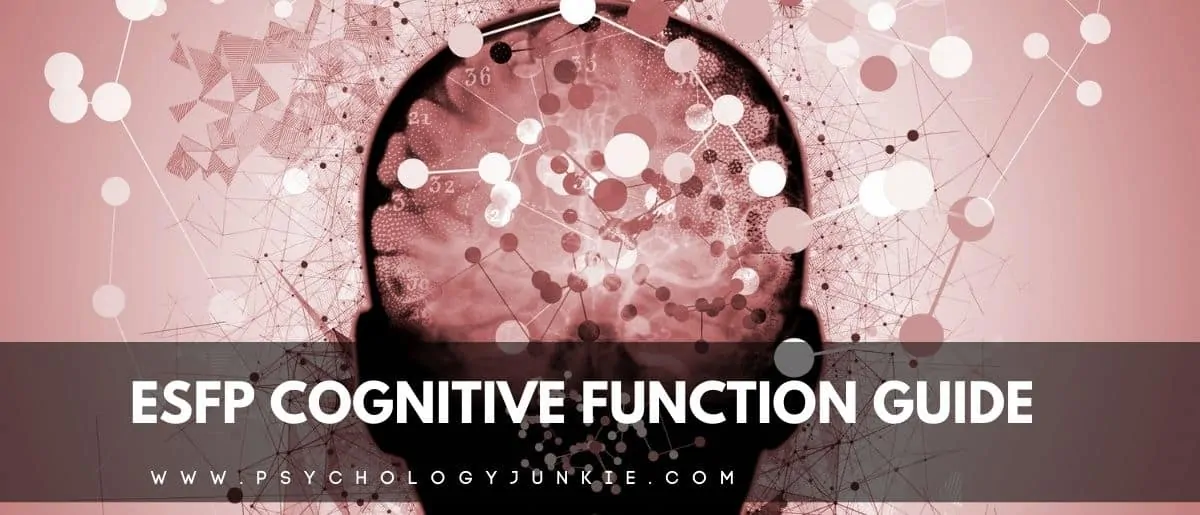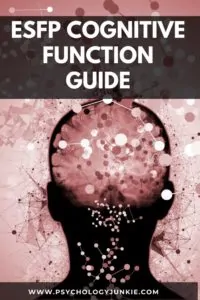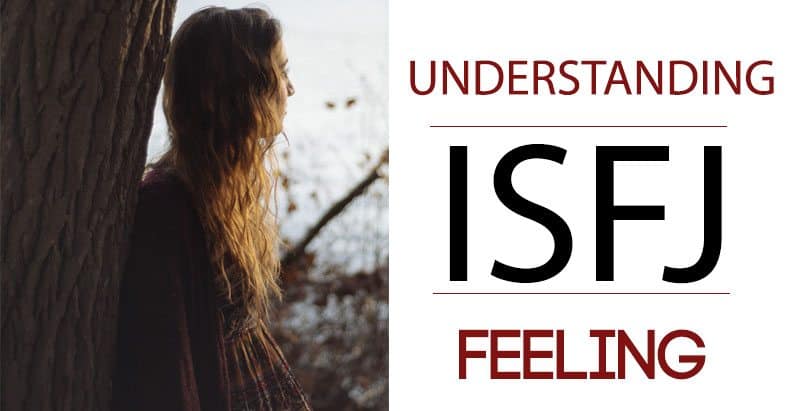ESFP Cognitive Function Guide
As an ESFP, you have a unique set of cognitive functions that filter the way you see the world and influence the way you make decisions. When you first take a Myers-Briggs style test, you might think that those four letters; E-S-F-P, are as far as the type journey goes. But would you like to dig deeper into your mental hardware? Would you like to get a more vivid glimpse into how your mind works? Then you’re in the right place!
Not sure what your personality type is? Take our new personality questionnaire here. Or you can take the official MBTI® here.

Today we’re going to look at your mental wiring. As an ESFP, your mind is mapped out in a completely different way from every other personality type. Let’s take a look at your cognitive function “stack” so you can see what tools you’re working with:
Table of contents
- ESFP Cognitive Function Stack:
- Dominant Function: Extraverted Sensation (Se)
- Auxiliary Function: Introverted Feeling (Fi)
- Tertiary Function: Extraverted Thinking (Te)
- Inferior Function: Introverted Intuition (Ni)
- The Opposing Role: Introverted Sensation (Si)
- The Critical Parent: Extraverted Feeling (Fe)
- The Trickster: Introverted Thinking (Ti)
- The Demon: Extraverted Intuition (Ne)
Estimated reading time: 14 minutes
ESFP Cognitive Function Stack:
ESFP Primary Function Stack (Most Valued Functions):
Dominant Function: Extraverted Sensation (Se)
Auxiliary Function: Introverted Feeling (Fi)
Tertiary Function: Extraverted Thinking (Te)
Inferior Function: Introverted Intuition (Ni)
ESFP Shadow Function Stack (Less Valued/More Unconscious):
Opposing Role: Introverted Sensation (Si)
Critical Parent: Extraverted Feeling (Fe)
Trickster: Introverted Thinking (Ti)
Daemon: Extraverted Intuition (Ne)
Now, without further ado, let’s explore what each of these functions means for you!
Dominant Function: Extraverted Sensation (Se)
Your dominant function is focused on staying present with the world around you and immersing yourself in it as fully as possible. You want to touch, taste, and explore every experience life provides you. Drawn to excitement and novelty, you enjoy adventures, spontaneity, and variety. Because you are so immersed in the present, you tend to notice details and objects more rapidly and accurately than other types.
As an Extraverted Sensor, you have a restless need to stay active and alert. As a result, you are usually responsive, quick-witted, and energetic. More than other types, you think best when there’s a sense of urgency. Many ESFPs respond quickly to crisis situations and can handle a lot of conflicting external stimuli. What would completely overwhelm other types in a sensory way can be energizing for you because you’re so fixated on absorbing and immersing yourself in the sensory world.
Auxiliary Function: Introverted Feeling (Fi)
The auxiliary function (Introverted Feeling) helps center you on what is congruent with your values. This means you ask questions of yourself like:
“What is my gut telling me about this?”
“Do I really want to do this or am I being pressured?”
“Am I being true to myself?”
“Is this person authentic?”
“Am I being authentic?”
“What really matters to me as an individual?”
Through Introverted Feeling, you stop yourself from being pulled in many different directions by the outside world. When you were younger, you probably didn’t have a good handle on Introverted Feeling. You might have left dozens of projects half-finished and you might have been more fixated on what was happening around you than what was happening in your heart. As you reached your teens, this function became more powerful. As an adult, this function is something you should rely on to inform every decision you make. Before chasing a new opportunity, you should analyze whether it lines up with your values, whether it matters in the long run, and whether you’re honoring your values and integrity. When you do this, you’re showing mature use of Introverted Feeling.
Tertiary Function: Extraverted Thinking (Te)
As you grow and mature, you find skill and joy in organizing, segmenting, and systematizing projects. You may become especially goal-oriented and aware of objective logic in your decisions. In early life, the tertiary function may seem out of reach to you. It might seem impossible to organize tasks, get things done on time, or make your life run efficiently. But as you grow and mature, you often rely on Extraverted Thinking as a “saving grace” that steps in and keeps your life from getting too out of control. The more mature you become the more logical and verifiable your arguments become. As you reach your 30s and beyond you become more and more adept at segmenting and organizing tasks so that you’re not always running behind on your obligations or ambitions.
Finding Relief in Extraverted Thinking:
Each personality type tends to find comfort and relief in their tertiary function. As a result, you tend to seek organization, logic, and efficiency when you are feeling out of control. You may try to streamline your projects or utilize time management techniques so you don’t feel overwhelmed. You may also enjoy the company of TJ personality types more and more as you get older. The direct, decisive, logical nature of TJs can be a relief and a comfort as you find yourself pulled in many different directions.
Inferior Function: Introverted Intuition (Ni)
As an ESFP, you focus primarily on the present moment and all the experiences and opportunities available to you right now. You like to be active and immersed in everything life has to offer. You want to touch, taste, and enjoy life every minute of the day. “Seize the day!” could be your motto and you try to live life in the fullest, most colorful way you can.
Because you’re in your element in the present, you tend to feel uncomfortable when you have to predict far into the future. Making guesses about your future and long-term commitments feels like a ridiculous gamble to you. What if you change your mind? What if your circumstances change? You tend to fixate on what you can do now rather than what you could do later.
Because you experience Introverted Intuition in an inferior sense, you can have difficulties understanding where Intuitive-Judging personality types are coming from. You might perceive them as unrealistic, out of touch, and removed. They, in turn, might see you as shallow, pleasure-seeking, and out-of-touch with the implications of your actions.
When you both realize that you are seeing two equally important perspectives in life, then you can learn from each other and respect each other.
Inferior Ni can mean that you fail to accurately predict where things will lead. You may also “leap before you look” and make risky, impulsive decisions at the expense of your future well-being.
It’s important to remember that tapping into your inferior function for short periods of time is useful and healthy. You can find ways to do that in our article: How to Improve Your Weaknesses, Based On Your Personality Type.
How Inferior Introverted Intuition Can Show Up During Stress:
During periods of intense or chronic stress, you might slip into the grip of your inferior function. When this happens, you become uncharacteristically gloomy and distant. Rather than enjoying what life has to offer you suddenly see nothing but a negative future ahead of you. You can see nothing but darkness and confusion and, as a result, you may detach from the activities you’d normally enjoy.
The Opposing Role: Introverted Sensation (Si)
As an ESFP, you are drawn to new and novel experiences. You enjoy staying in the present moment, grasping opportunities as they arise, and being spontaneous. A planned-out, routine life can make you feel bored, irritable, and trapped. When you spend time with ISJs, you might feel like they’re being restrictive, condescending, or oppositional. You might think to yourself, “Why are they limiting my options?” “Why are they going into so much detail about this?” “Why do they keep dredging up the past?”
Simultaneously, you might experience Introverted Sensation in a destabilizing way. You might inadvertently find yourself recalling past mistakes or traumas and assuming the same situations will repeat themselves. You might get so fixated on the nitty-gritty details of a project that you don’t make progress because you can never make every detail perfect.
When you find yourself being stubborn or oppositional, you might want to ask yourself, “Am I getting too stuck on little details?” “Am I assuming a past experience will repeat itself?” “Am I not letting go of a past mistake that I or someone else made?” “Am I making assumptions about this person based on a previous experience?”
Introverted Sensation isn’t always a negative part of your life. You might be able to provide a good historical context to a situation by reviewing details or lessons from the past. You might also have a knack for noticing details and discrepancies that other types don’t.
The Critical Parent: Extraverted Feeling (Fe)
As an ESFP, you value Introverted Feeling (Fi) over Extraverted Feeling (Fe). You crave a sense of harmony with others, but not at the expense of your individual values. Introverted Feeling focuses on living in harmony with one’s own values and desires, which means that you prefer to stick to your individual code of ethics and path in life. You also try to hold space for others to be their unique selves.
The Good Side of Critical Parent Fe:
Critical Parent Extraverted Feeling can help you to have a stronger sense of the needs and values of the people around you. It can help to broaden your views, consider other people’s needs, and assess group and societal values to determine whether they are valuable for yourself or others. Critical Parent Fe can help you to express your feelings and feel a stronger sense of unity and mutual support with others.
The Potential Negative Sides of Critical Parent Fe:
When you feel vulnerable, attacked, cranky, or ashamed your Critical Parent might show up in belittling or harsh remarks towards yourself or others. You might chastise yourself or others for failures at Extraverted Feeling (responding to group needs, respecting societal values, demonstrating feeling values outwardly). You might have intrusive thoughts like: “You never think of anyone but yourself,” “You had to make everything awkward, didn’t you?” “You’re such a weirdo,” “You’ll never fit in.”
You also might find yourself getting annoyed by expressions of Extraverted Feeling, saying or thinking things like:
“Why do you have to be so worried about what everyone else wants? Don’t you have any of your own values.”
“Why are you such a people pleaser? It’s like you don’t even know yourself.”
“Stop trying to make me conform to your group values!”
“You can’t control me or tell me how to feel!”
Retaliating with Critical Parent Fe:
You might also exude Critical Parent Fe when you’re feeling vulnerable or stressed. At these times you might imply that others should get in line with group values or focus on others instead of themselves. Even though you don’t like feeling pressured to conform to group values, you might find yourself convincing others to do so for the betterment of the group.
Critical Parent Fe and Projections:
Critical Parent Fe can show up in your interactions with Feeling-Judging personality types (xxFJs). You might feel like people who value Extraverted Feeling are being critical or condescending when they are not. Their natural tendency to try to get people on the same page can seem off-putting to your Introverted Feeling desire for autonomy and personal freedom. Their tendency to strive for group needs over individual needs can feel anathema or irritating to you.
The Trickster: Introverted Thinking (Ti)
As an EFP, you enjoy exploring ideas and experiences that align with your deeply-held values. When you make decisions you focus first on what’s right for you ethically (according to your personalized moral code) and what makes sense productively. Freedom, personal ethics. and efficient implementation matter a great deal to you.
The Trickster and You:
Analyzing and categorizing impersonal data according to mapped-out logical principles can feel overwhelming or pointless to you. While you enjoy learning new things and are driven by curiosity, you’re more interested in the implementation of those things than mapping out all the technical details of how they work, why they work, and whether they are logically consistent.
When called upon to use Introverted Thinking (your Trickster), it can feel exhausting to you because this isn’t your valued or preferred way of processing information. When you’re dealing with impersonal data you prefer to process it through Extraverted Thinking (Te), your tertiary function. You want to figure out how the data can be used efficiently in the outside world, not spend time sorting it all out and categorizing it.
When you use Trickster Ti, you can get stuck in continually redefining and refining information, inevitably ending right back where you started. You can get stuck in periods of analysis-paralysis that never seem to end.
At the same time, when people are using Introverted Thinking to give you a critique or hone-in on the accuracy of what you’re saying, you can feel like they’re being ridiculous, over-the-top, pedantic, or silly. You may inwardly (or outwardly) poke fun at them, make light of what they’re saying, or use humor to deflect the attention away from yourself or invalidate their argument in some way.
The Positive Side of Trickster Ti:
When you accept Introverted Thinking as something valuable and worthwhile, you can form deeper bonds with those who value it (TP personality types). You may at times create fine-tuned arguments to prove your points. In typical Trickster fashion, these arguments will be embellished with humor and playfulness.
The Demon: Extraverted Intuition (Ne)
ESFPs tend to fixate on realities and details rather than hypothetical possibilities or abstract connections. The world of the now is the real world to them, rather than the world of “someday.” They want to be secure on the facts and details of what’s happening around them rather than generate possibilities on things that, as of now, don’t exist. Hypothesizing and predicting can feel extremely risky because so much of life is changing at a constant pace.
How Lack of Ne Can Show Up:
You may wind up in precarious or difficult situations because you haven’t spent time reading between the lines enough. Because you didn’t see a hidden meaning or connection you may fail to see how one of your actions set off a series of other reactions that led you onto a road that you never wanted to be on to begin with. You may feel stuck when life turns out poorly, not seeing a situation beyond the present or a possibility outside of your present pain or the “facts” that can’t be changed.
How Demon Extraverted Intuition Shows Up During Strenuous Times:
In a destructive way, you may inflate Ne when you are feeling at the end of your rope. During times like this, you might misinterpret the meaning of someone’s actions and project negative intentions where there weren’t any. You may suddenly have dozens of hypothetical possibilities and connections in your mind that all seem to lead in negative directions. You might get lost in conspiracy theories or rabbit trails of destructive thought rather than staying as grounded as they typically are. When you are in the energy of the dominant function (Se), you appear confident and focused. When in the energy of the Demon (Ne), you appear and feel confused, random, and scattered. Instead of focusing on what’s real and tangible and provable (Sensing), you appear less focused, realistic, and pragmatic.
You might project Demonic Ne onto other types who use Ne (NP personality types). You might assume that NP types are scattered, unrealistic, and destructive simply because that’s how you feel when you experience Ne.
At the moment of your most intense desperation, you might suddenly be able to use Extraverted Intuition adeptly. When this happens, you might surprisingly visualize a potential solution just at the nick of time. You might creatively work with abstract ideas, seeing a connection between one event or situation and another and developing a clearer insight into the relationship and connections between things and how to solve a problem or move forward in life. You may also be able to produce retaliatory attacks on others who are unfairly targeting or shaming you, bringing up connections and inferences that dismantle your attacker’s accusations or spiteful remarks.
The Positive Side of Demon Extraverted Intuition:
The Demon isn’t always bad. Once you learn to accept Ne and give space to its insights you can explore more possibilities, see more hidden connections, and evaluate future possibilities more accurately. You can also form deeper bonds with NP personality types.
What Are Your Thoughts?
Did you enjoy this article? Do you have any insights or experiences to share? Let us know in the comments!
Find out more about your personality type in our eBooks, Discovering You: Unlocking the Power of Personality Type, The INFJ – Understanding the Mystic, The INFP – Understanding the Dreamer, and The INTJ – Understanding the Strategist. You can also connect with me via Facebook, Instagram, or Twitter!
Other Articles You Might Enjoy:
What It Means to be an ESFP Personality Type
7 Ways That ESFPs Make an Impact
ENFP or ESFP – Which One Are You?
10 Things ESFPs Look For in a Relationship














